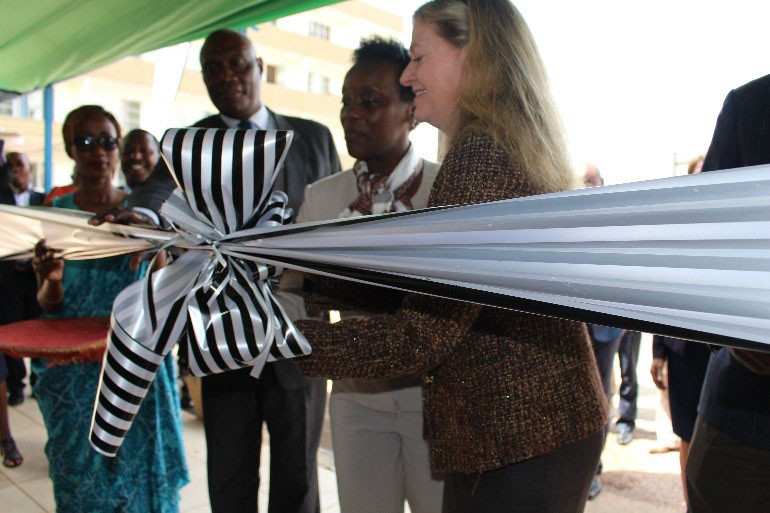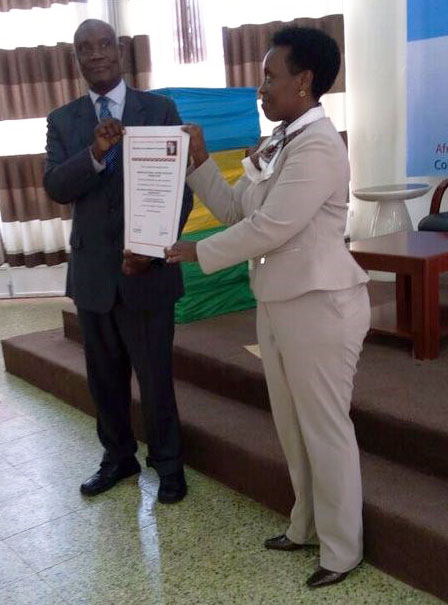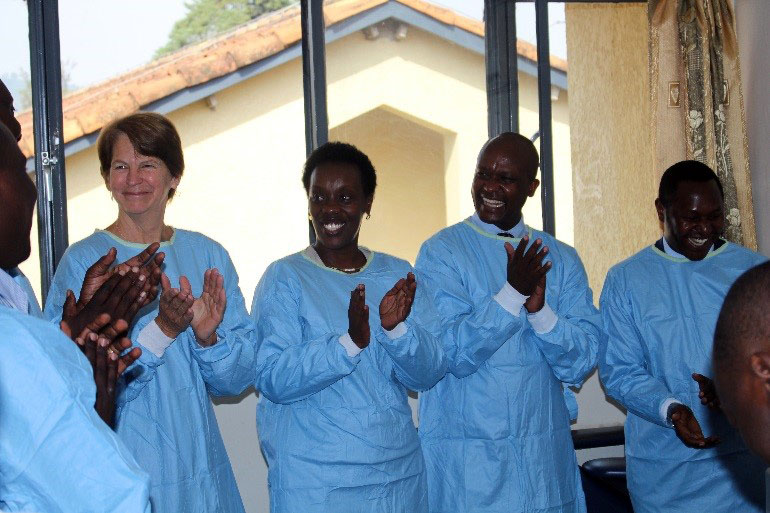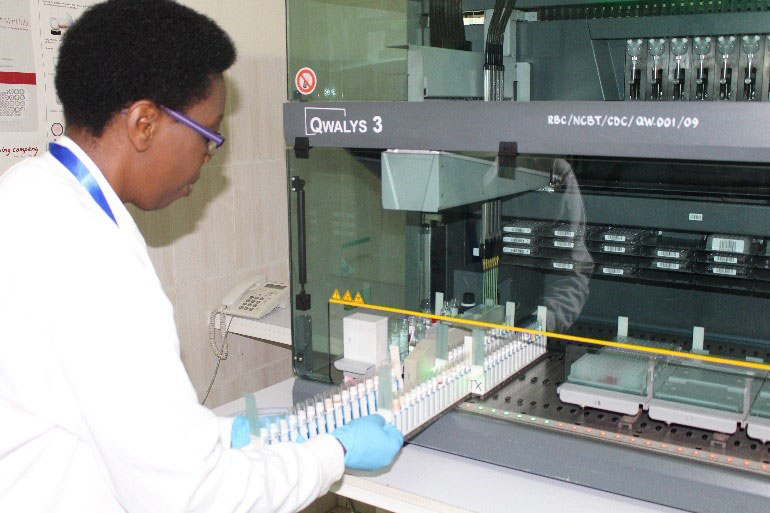Rwanda’s National Center for Blood Transfusion Attains International Standards
By CDC Rwanda Team

Amb Barks-Ruggles and Hon. Min. Gashumba cut the ribbon to officially open the AfSBT-RBC Collaborating Center.
On February 10, 2017, Rwanda’s National Center for Blood Transfusion (NCBT) was awarded the highest – Level 3 – international standards accreditation by Africa Society of Blood Transfusion (AfSBT). The ceremony was co-officiated by U.S. Ambassador to Rwanda Erica Barks-Ruggles, Hon. Minister for Health Dr. Diane Gashumba, and Africa Society of Blood Transfusion (AfSBT) President of the Board of Governors Dr. Gabriel Muyinda. This tremendous achievement means NCBT is now an internationally recognized regional center of excellence in blood transfusion practice, able to offer blood transfusion medicine and technical expertise services to neighboring countries as needed. It also marks a milestone in Rwanda’s HIV prevention through blood safety strategy. Dr. Swaibu Gatare, Division Manager of NCBT says, “We could not have done it without the support of PEPFAR and the Centers for Disease Control and Prevention (CDC) Rwanda.”
AfSBT is the continental body that acknowledges attainment of international standards, recognizing blood banks as centers of excellence in Africa. Institutions seeking international standards accreditation through AfSBT go through a three-step certification process from Level 1 to Level 3. Rwanda is the second country in Africa after Namibia to achieve this highest level of AfSBT accreditation. AfSBT has also identified Rwanda’s NCBT as its Regional Center of Excellence in Blood Banking, making NCBT/Rwanda Biomedical Centre (RBC) an AfSBT Regional Collaborating Center for regional training.

Hon. Min. Dr. Gashumba receives the accreditation certificate from Dr. Muyinda of AfSBT.
The NCBT story is one of Rwanda’s many public health success stories. However, the path to this success has not been easy. The U.S. government, through CDC with funding from PEPFAR, has helped transform NCBT by enhancing and expanding capacity as a core activity in HIV prevention. Between the time of the 1994 genocide and 2005, Rwanda did not have a national blood policy and guidelines, and the country therefore experienced perennial blood shortages as well as a lack of testing reagents and cold chain equipment. In addition, an inadequate blood transportation system from mobile collection centers, combined with an insufficient blood production, limited geographic distribution and access to safe blood. As Rwanda rebuilt its institutions and focused on national efforts to prevent HIV transmission, safe blood became a central strategy. Yet Rwanda still faced vast limitations due to lack of capacity and resources. The law establishing Centre National de Transfusion Sanguine (CNTS), later renamed National Center for Blood Transfusion (NCBT), facilitated mechanisms for resource mobilization for the Ministry of Health. Through Government of Rwanda (GoR) partnerships with international donors, NCBT received funding and capacity-building support. The USG, through CDC, has offered technical support to NCBT since 2002. This support has helped transform NCBT into a nationwide institution with four fully functional state-of-the-art regional blood collection centers (RCBT). This has greatly improved geographical access to safe blood in all the five provinces, with the main headquarters and laboratories in Kigali City.
Through this support, NCBT was transformed from a small family donation unit focusing on district-level service delivery into a nationwide institution with four fully functional state-of-the-art RCBTs, each getting blood from voluntary, unpaid donors.

Hon. Min Gashumba with Dr. MacDonald, Dr. Gatare and other NCBT staff during a tour of the NCBT facility.
Quality assurance is maintained at the regional centers though their connection to the main central testing laboratory located at the Rwanda Biomedical Centre (RBC) in Kigali City. With these new quality standards now in place, NCBT applied for and received Level 1 accreditation from AfSBT in 2013. In 2014, AfSBT awarded NCBT Level 2 accreditation, and in 2016, NCBT attained AfSBT’s highest, Level 3 international standards accreditation.
Was this easy? No, not at all. NCBT had to contend with a decrease in donor funding during the accreditation process. This was particularly difficult because at the time over 90% of NCBT’s budget was donor-supported. However, NCBT’s management and staff did a tremendous job throughout the process.
Dr. Gatare says, “The secret to achieving this milestone can be attributed to senior management involvement, self-motivated staff, and the determination to excel.”
Since NCBT received Level 1 accreditation in 2013, no cases of transfusion transmitted infections have been reported in Rwanda. There has also been a marked decline (56%) in the rate of HIV among blood donors from the 2000 rate of 1.6% down to a rate of 0.9% in 2015 and 0.6% in 2016.
NCBT now faces the challenge of sustaining these high standards. Despite their exemplary performance, funding for blood safety in Rwanda has continued to decrease. This presents a challenge to NCBT’s efforts to sustain their Level 3 accreditation status.
Dr. Gatare says it best, “As we all know, quality is not a destination but a journey. Level 3 has been achieved, but in 3 years a reassessment will be carried out to ensure that we are still maintaining the same level of excellence. We hope that the attainment of this Level 3 will increase confidence from our stakeholders and donor community to support HIV prevention through safe blood strategies in Rwanda.”

An NCBT staffer uses one of the machines provided by CDC through PEPFAR.
The success of NCBT lies in its key activities, including blood donor mobilization, recruitment of volunteer nonremunerated donors, testing, processing, storage, and distribution. NCBT ensures 100% screening of all blood donated for transfusion-transmissible infections (TTIs) that include HIV, hepatitis B/C and syphilis. The most vulnerable groups necessitating blood transfusion are mothers during delivery, neonates, children under five years, expectant mothers with infections such as malaria, and trauma patients. NCBT’s mission is to provide safe, adequate, and effective blood and blood products to all patients in need. The screening contributes significantly to reduction in TTIs, thus protecting blood recipients from passively acquiring these infections.
Blood transfusion is a life-saving medical intervention. The NCBT success story helps highlight the important role that access to an adequate supply of safe blood and blood products plays in the Government of Rwanda’s national HIV prevention strategy.
The USG is a proud partner of NCBT and its legacy of giving a vital service to the people of Rwanda; quietly saving lives and preventing HIV, HBV, HCV, and syphilis infections to vulnerable blood recipients.